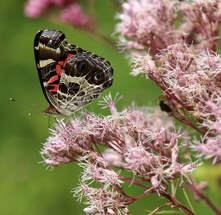CONSERVATION CORNER
A weekly blog for all things conservation
 Reprinted from Forest Fridays- a DCNR publication. by Ryan Reed, Natural Resource Program Specialist, Bureau of Forestry. Just a few years ago the topic of Colony Collapse Disorder (CCD) was at the forefront of natural science and media inquiry in Pennsylvania. CCD is the term applied to the sudden deaths of entire honeybee colonies, many of which are domesticated hives. The phenomenon of CCD portended the potential for massive losses of food production capability, as domesticated bees (through pollination) are responsible for a reported one-third of all the food we eat. CCD has no doubt affected food supplies and cost. Research points to multiple reasons for CCD, suggesting a synergistic effect between these factors, which include chemicals like insecticides and herbicides, parasitic mites and other pathogens, and loss of habitat. The loss of honeybee colonies is certainly problematic, but I can’t help but wonder about a system of agriculture that relies so heavily on pollination by domesticated means. What if our natural systems supported other native pollinators well enough to replace honeybees, which are not native? If we can control millions of acres of arable soil and what grows there, it stands to reason that we could cultivate natural systems that support quantities of native pollinators to adequately pollinate our crops.
It’s not just honeybees that are suffering. The sad reality is that pollinators of all shapes and sizes, like solitary native bees, butterflies, moths, birds, and bats, are disappearing too. The human fingerprint on all these losses is indisputable, but this reality also suggests that we have the power to reverse this trend. We can start by dedicating more of our land to healthy natural habitat, and this can be done through a variety of means. Options include less mowing, installation of native gardens and landscaping with native plants, preservation of forests, removal of invasive plants, and forgoing the use of toxic chemicals. In honor of PA Native Species Day, and National Pollinator Week (last week), I’m asking readers to consider the critical link between our native plants and pollinators, and how this relationship affects our food supply and the lives of other organisms like birds and mammals. Let us all take a few steps to benefit our native species. I’m willing to bet that environments with a healthier mix of native plants and animals would benefit honeybees, too.
0 Comments
Leave a Reply. |
AuthorsVarious staff at the Bradford County Conservation District Archives
July 2024
Categories
All
|
|
Bradford County Conservation District
Stoll Natural Resource Center 200 Lake Road, Suite E | Towanda PA 18848 Phone: (570)-485-3144 |
